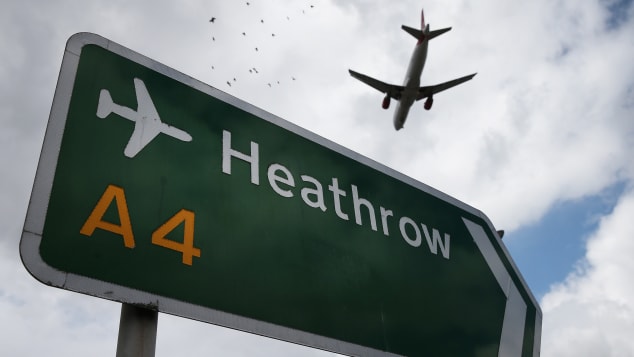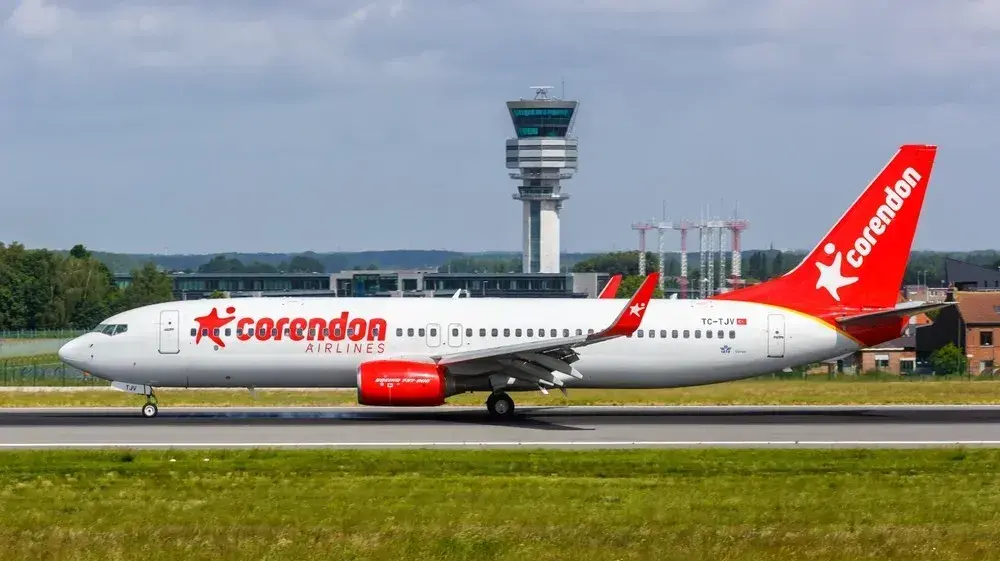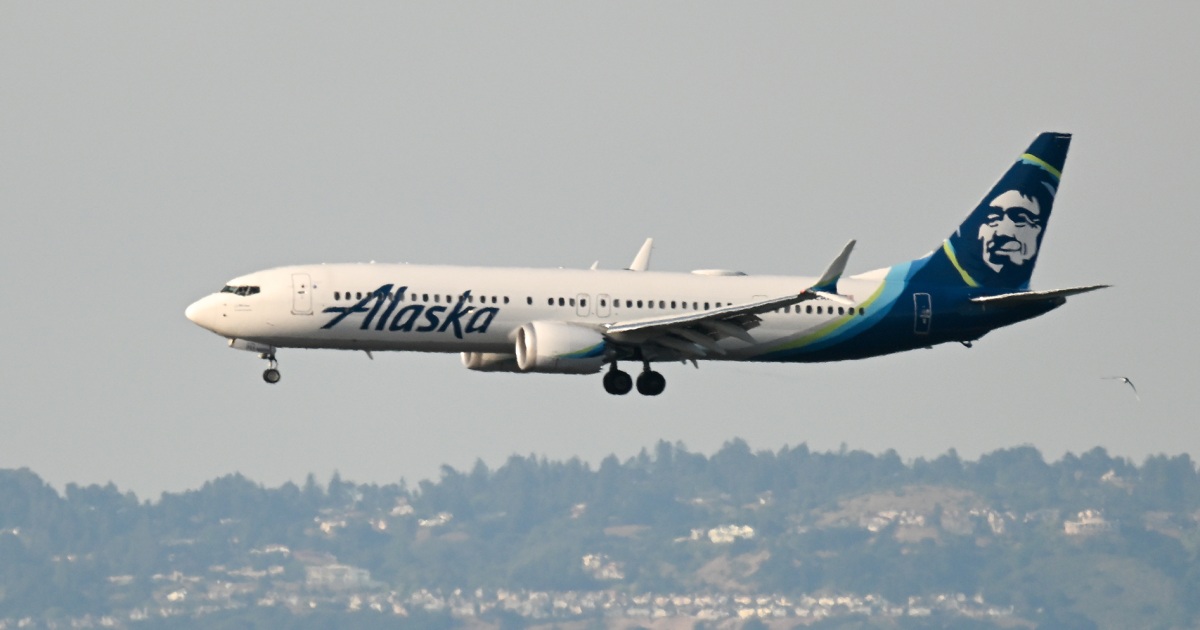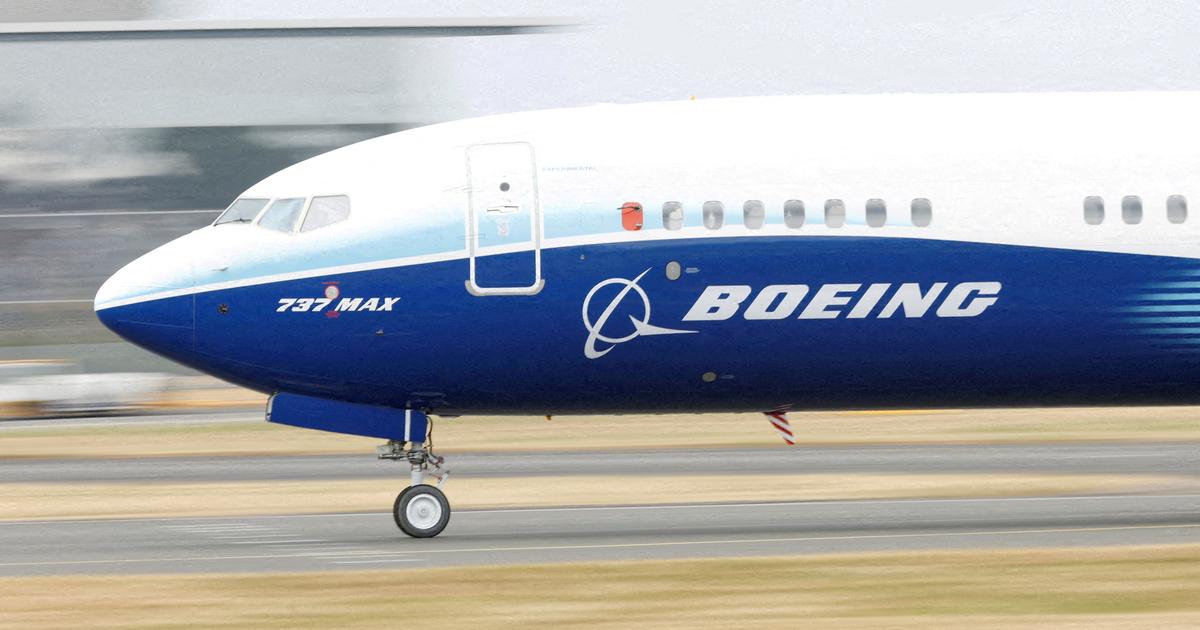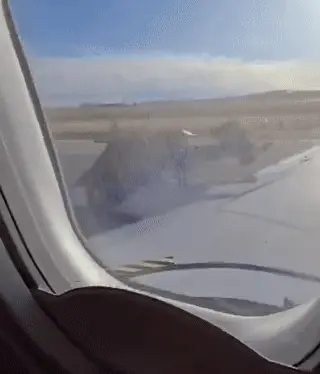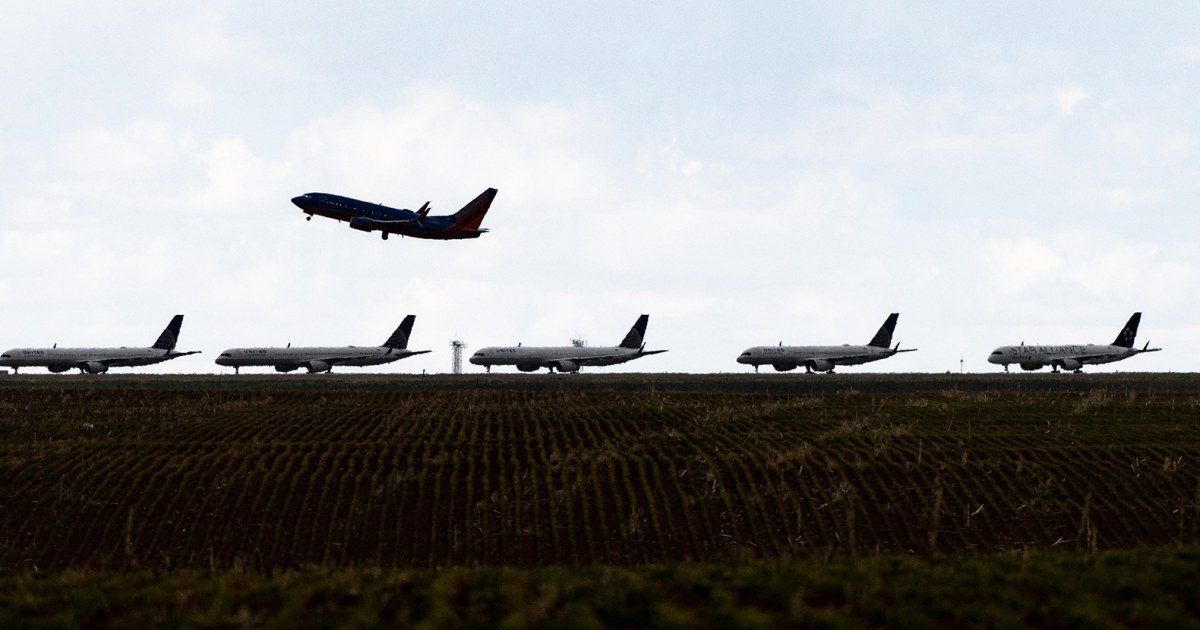Airlines resume flights to the US after 5G network activation 0:43
(CNN) --
In the early days of the pandemic, when the demand for air travel dropped sharply and international borders were closed, "ghost flights" became a common phenomenon.
These were empty or nearly empty planes streaking across the horizon as airlines fulfilled their contractual obligations to fly.
The problem is that, almost two years later, they are still haunting the sky.
In fact, more than 100,000 "ghost flights" will cross European skies this winter, according to a recent Greenpeace analysis.
Climate damage, says the environmental organization, is "equivalent to the annual emissions of more than 1.4 million cars."
The Greenpeace figures are extrapolated from a December interview with Lufthansa CEO Carsten Spohr, in which he warned that the Lufthansa Group faced the prospect of 18,000 unnecessary flights during the six-month winter season. to keep their slots according to European standards.
Assuming that Lufthansa air traffic represents 17% of the European market, Greenpeace calculates that the total number of ghost flights in Europe would generate 2.1 million tons of CO2.
The analysis has provoked an outpouring of outrage.
Activist Greta Thunberg claimed that "Brussels Airlines [part of the Lufthansa group] makes 3,000 unnecessary flights to maintain airport slots."
In the UK a petition was launched calling on the government to ground unoccupied flights.
advertising
Lufthansa, for its part, says it is doing its best to fill all its planes, but was struggling to balance the chaos of Covid with the need to maintain its slots.
"Unnecessary flights are not empty or 'ghost' flights," a spokesperson for the airline told CNN.
"These are scheduled flights that are misbooked due to the pandemic."
Despite low demand, the Lufthansa Group must operate these flights to continue to secure take-off and landing rights at hubs and major airports in the European Union."
Lufthansa claims that the appearance of the omicron variant is the reason why its forecasts for the coming season were so far from reality.
The crisis "caused a significant increase in travel restrictions and cases of illness in the general population and among employees," says its spokesman.
"This unexpectedly not only reduced the previous trend of recovery, but also caused a significant drop in demand."
Last October, the aviation sector made a commitment at the annual meeting of the International Air Transport Association (IATA) to achieve zero carbon emissions by 2050.
Numerous actors, including hub airlines, low-cost carriers, regulators and environmental lobbyists, are locked in a multi-directional blame game over the absurd waste of unnecessary flights.
"We are in a climate crisis, and the transport sector is the one that grows the most in emissions in the European Union: useless and polluting 'ghost flights' are just the tip of the iceberg," says Herwig Schuster, spokesperson for the campaign. "European Mobility for All" by Greenpeace.
"It would be irresponsible for the European Union not to take the easy way out by ending ghost flights and banning short-haul flights where there is a reasonable rail connection," he adds.
So why do these desert flights continue?
And what are aviation stakeholders doing to get rid of the bureaucracy that has trapped airlines in this climate-damaging mess?
Is there a best day to buy flights?
No, but there are services to find cheap flights
valuable assets
The reason airlines continue to operate these expensive flights is because the industry is immersed in a higher and more lucrative slot game than anything to be found in Las Vegas.
Even when passengers don't show up, airlines have to protect their slots: their scheduled time on valuable routes.
Slots are very valuable assets for airlines.
With more than 200 of the world's busiest hubs operating at full capacity, the demand for flights outstrips the availability of runways and terminal space.
To manage this, the capacity of congested airports is segmented into time slots.
It is about the possibility of landing, disembarking passengers, refueling, accepting new passengers and taking off again, all within a determined and regulated period.
Carriers then plan their schedules based on the availability of slots at both ends of the route.
To maximize revenue, hours need to be matched to demand: early morning slots for business travelers making short-haul, same-day roundtrips are highly appreciated.
But synchronizing the schedule of both ends of the journey when the most desirable airports are full is no easy task.
"If you take off from one place, you have to know that you can land at a certain time in another," says IATA's Paul Steele.
"If you mess with slot allocation at one end of the process, you create chaos at the other, and that's why we need a harmonized system."
That's where the World Airport Slot Guidelines (WASG) come into play.
They are the basis on which the global slot allocation process works.
The Guidelines (published jointly by IATA, Airports Council International and the World Group of Airport Coordinators) aim to provide "transparency, flexibility, security, consistency and sustainability...for the benefit of airlines, airports and consumers" .
The head of Lufthansa claims that the group will have to make 18,000 unnecessary flights during the winter season to maintain its slots at airports.
Credit: Silas Stein/AFP/Getty Images
a complicated system
But with airlines operating hundreds of city-pair routes, some synchronized with connecting flights, it's a complicated system to manage, and allocation has to be done twice a year for summer and winter season schedules.
Re-scheduling all of this every six months would be too much of a hassle, so there is a rule that if an airline successfully uses its slot at least 80% of the time, it is allowed to keep the slot the following season, through a seniority clause for “acquired rights”.
Therefore, there is very little flexibility in the network to introduce new routes, especially at congested airports.
And that's why slots are worth gold.
In the UK, Heathrow Airport has the most valuable slots.
The limited capacity of this airport has pushed up the price of slots: a couple of slots in the early morning are worth about US$19 million, which is reduced to US$13 million and US$6 million in the afternoon, according to a UK House of Commons briefing paper.
Among the record-breaking deals in which airlines have negotiated these slots is the case of Oman Air, which was reported to have paid $75 million for a pair of takeoff and landing slots at Heathrow in early 2016. In March 2017, SAS Scandinavian Airlines sold two pairs of slots at Heathrow to American Airlines for $75 million, according to the same newspaper.
However, airlines often keep these contractual details secret.
Slots can also be traded in other ways, such as trades between airlines, similar to how football teams have players on loan.
Due to the "grandfather" system, airlines that reduce the use of slots run the risk of losing them.
Shrinking capacity jeopardizes airlines' control over their slots, so planes can keep operating even when hardly anyone is flying them.
Flexibility of the bureaucracy
Two years ago, when the initial impact of covid decimated airline networks, the 80% rule was relaxed.
In the United States, the Federal Aviation Administration (FAA) renounced the use of slots, just as it had previously suspended the regulation in 2002, 2003 and 2009, after the terrorist attacks of September 11, 2001 in the United States, the SARS outbreak and the global financial crisis, respectively.
And in Europe, for the current 2021-2022 winter period, the "use it or lose it" threshold has been lowered to 50%.
But airlines face greater uncertainty and want more wiggle room to retain their slots.
The Air France-KLM group, for example, published a statement requesting that "the current situation [of covid] be taken more into account in the application of European regulations so that airlines can continue to adjust their offer to the levels actual demand".
In particular, the Group seeks greater flexibility "in the application of force majeure rules that allow exceptions to the 50% rule of use of time slots".
In response, and perhaps in recognition that the omicron variant is wreaking havoc on travel plans around the world, the European Commission issued an extension to the slot waiver rules with effect until 29 October 2022. However, the Commission will raise its threshold to 64% in April.
"Advances in vaccination campaigns and the European Union's Covid-19 Digital Certificate have helped restore traveler confidence and air connectivity in the EU, putting the sector in a stronger position to deal with disruptions. in the short term," explains Adina Vălean, European Union Commissioner for Transport.
"Although we have not yet achieved it, we can take another step towards returning to the normal management of slots at airports next summer."
Vălean says the European Union is monitoring the situation, acknowledging the persistent impact of the omicron variant on airline bookings.
"The Commission has shown throughout the COVID-19 crisis its willingness and ability to act quickly when needed, and it will continue to do so in the coming months," he adds.
Heathrow is the UK's busiest airport.
Credit: Peter Macdiarmid/Getty Images Europe/Getty Images
Payback time?
From the point of view of one of the largest low-cost airlines in Europe, solving the problem of ghost flights can be simple.
Low-cost airlines will have big changes 3:52
Ryanair boss Michael O'Leary says that "if Lufthansa really needs to operate these flights (solely to prevent these slots being released to competing airlines), they should be required to sell these seats to the public at low".
O'Leary's argument is that Lufthansa and its subsidiary airlines (Brussels Airlines, Swiss and Austrian) have benefited from billions of state aid.
Therefore, "instead of operating empty flights just to be able to block slots, Lufthansa should put the seats on these flights up for sale at low prices to reward the German and European taxpayers who have subsidized it with billions of euros during the covid crisis," he says.
However, the Lufthansa spokesman maintains that the situation is different for the big airlines.
"Network carriers such as the Lufthansa Group rely more on slots for connecting flights connecting passengers to long-haul routes at the group's hubs than low-cost airlines, which typically fly to airports smaller ones where there is usually no shortage of slots," he says.
The only exception to the use or lose rule is the force majeure clause.
However, this is not interpreted uniformly throughout Europe.
Many countries do not grant any exceptions or only a few.
Furthermore, the application of exceptions is very bureaucratic and time consuming.
Each exception must be granted individually: for the starting point and the destination, so two approvals are always needed.
As approvals are often granted at short notice before a flight, there is not enough time for passengers to rebook.
Lufthansa says it wants all EU member states to be granted exceptions to the take-off and landing rules so that it can deal with the issue flexibly, minimizing red tape for the current winter schedule.
"The EU Commission should advocate for uniform regulations so that unnecessary flights are avoided and airlines can plan better," says their spokesman.
Spirit and Frontier airlines plan US$ 6.6 billion merger: they would create the fifth largest airline in the United States
protect and compete
For its part, ACI Europe, the professional association of airport operators representing more than 500 airports in 55 countries, has expressed dismay at the growing political and industry rhetoric around ghost flights.
It also calls into question the reasoning of major airlines that ghost flights are inevitable.
"Some airlines claim that they are forced to operate a large number of empty flights to retain the rights to use airport slots. There is no reason for this to be the case," says ACI Europe Director General Olivier Jankovec.
The rules for the use of slots, he says, have to achieve two things in the current circumstances: "protect airlines from the worst unforeseen events, which are out of our hands, and, fundamentally, guarantee that airport capacity continues to be used competitively."
Jankovec adds that reconciling commercial viability with the need to maintain essential connectivity and protect against anti-competitive consequences is a delicate task: "We believe that the European Commission has got it right. Talking about ghost flights, and their environmental impacts, seems to hint at a scenario catastrophic that has no place in reality. Let's focus on the vital task of recovering and rebuilding together".
Going a step further, on February 2, IATA published a statement welcoming updated guidelines from the European Association of Airport Coordinators, aimed at providing a more harmonized policy on slot usage thresholds. .
IATA director general Willie Walsh said such a move was crucial to "maintain critical European air connectivity" and to "level the playing field with jurisdictions that have recognized the need for full flexibility."
That promise of flexibility will be critical to minimizing empty flights.
But ultimately its complete eradication will only be achieved when the public's propensity to travel by plane, facilitated by the eventual and total defeat of covid, allows airlines to fill their planes with paying passengers, instead of with ghosts.
flights

